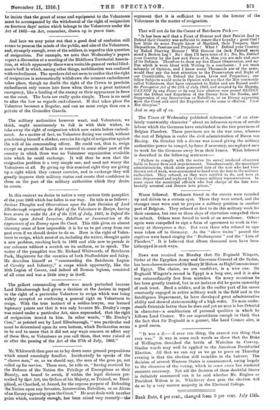The gallant commanding officer was much perturbed because Lord Ellenborough
had given a decision at the Assizes in regard to the -right of a particular Volunteer to resign which was being widely accepted as conferring a general right on Volunteers to resign. With the true instinct of a soldier-lawyer, our learned legionary points out that it was only because Mr. Douley's corps was raised under a particular Act, since superseded, that the right of resignation inured to him. In other words, "Mr. Douley's Case," as pointed out by Lord Ellenborough, "was particular and must be determined upon its own bottom, which Declaration seems to be and to mean that it did not any ways concern or affect any of these Men, or Volunteers as you call them, that were raised at or after the passing of the Act of the 27th of July, 1803."


































 Previous page
Previous page